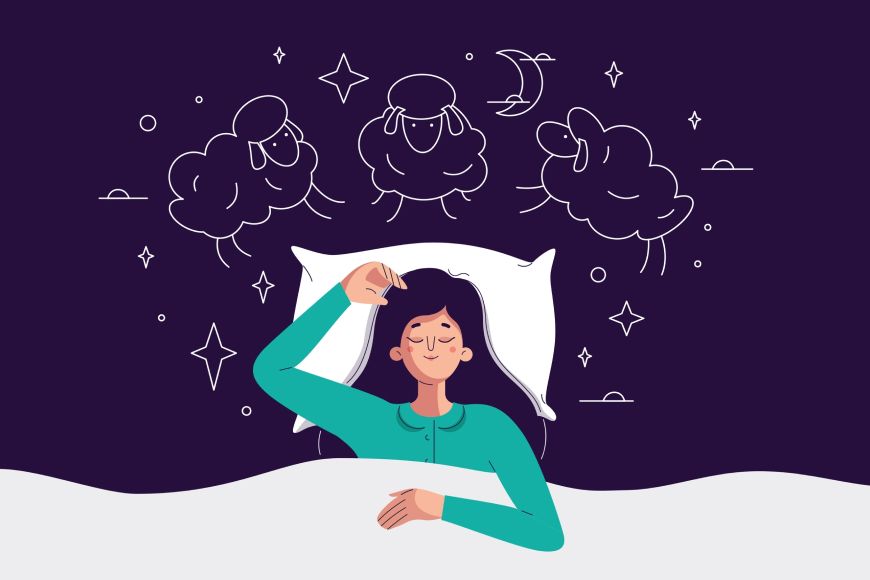By Rychel Johnson, M.S., LCPC, Licensed Clinical Professional Counselor
Updated on February 13, 2024
Published on August 23, 2023
Fact Checked

Get latest news, updates, and trends on mental well-being

You may find yourself scrolling through your phone at night while relaxing in bed or on the couch. Or leaving your TV on to bask in its soothing background noise as you attempt to fall asleep at the end of a long day.
It may seem harmless, but did you know this can overstimulate your brain before sleep? Even if you doze off immediately, extra light and sensory input can lead to less-than-optimal sleep.
If this describes you, you certainly are not alone. Even knowing that phones and televisions add unnecessary stimulation doesn’t help us change habits we started years ago.
In a study by the University of North Carolina in 2021, participants who averaged six or fewer hours of sleep per night were about 2.5 times more likely to experience frequent mental distress1 than those who routinely slept more than 6 hours.
In this article, we’ll explore how sleep affects mental health in-depth, including some takeaways you can apply as you prepare for sleeping as soon as tonight.
Does sleep affect mental health? Absolutely.
The link between sleep and mental health is a powerful one. It’s a two-way street, with sleep influencing mental health and mental health influencing sleep.
Recognizing the bidirectional influence of sleep and mental health is the first step toward breaking the cycle of poor sleep and reduced mental well-being.
Sleep plays a role in two critical neurological processes:
Rapid Eye Movement (REM) sleep, or dream sleep, is associated with emotional regulation, which is the key to mental health. REM sleep helps your brain process and make sense of emotional experiences, contributing to better emotional resilience.2
Therefore, your sleep habits, including sleep quality and consistency, profoundly impact your mood and emotional resilience.
Poor sleep quality, frequent awakenings, and irregular sleep patterns can lead to mood disturbances, such as:
Sleep disturbances can exacerbate existing mental health conditions and reduce emotional resilience, making it harder for individuals to cope with stressors.2
Finding the right balance of sleep duration is crucial for maintaining emotional equilibrium. Too little sleep is linked with an increased risk of mood disorders, and too much sleep may indicate depression. Your need for sleep is unique but generally falls within 7-9 hours3 for adults.
Sleep hygiene is a term used to describe practices and habits that promote healthy sleep.
These practices encompass aspects of daily life, from the bedroom environment to bedtime routines and lifestyle choices.
Sleep hygiene aims to create an optimal sleep environment and routine that helps you fall asleep faster and wake up refreshed.
Sleep hygiene involves daily habits4, such as:
Going to bed and waking up at consistent times every day, even on weekends, helps regulate your body’s internal clock or circadian rhythm.
A relaxing bedtime ritual5 can signal to your body that it’s time to wind down and prepare for sleep. Your bedtime routine can include the following:
Mindfulness techniques can help calm the mind and reduce stress, improving sleep quality. Bonus: they don’t need to take hours out of your evening.
Some mindfulness approaches6 to try::
Your sleep environment significantly determines your sleep quality. Temperature, light, and noise are three key factors impacting your sleep and mental well-being.7
Creating a sleep-conducive environment can significantly enhance sleep quality and improve mental well-being. It’s an often-overlooked aspect of self-care that can profoundly impact overall health.
Some ideas to consider when creating a bedroom sleep sanctuary include the following:
Inadequate sleep can lead to various negative consequences for cognitive function and mood, including the following:
There’s a connection between poor sleep and cognitive functions, such as decreased attention and difficulty with decision-making. Sleep disruption can worsen existing mood disorders.8
Additionally, sleep deprivation can increase emotional instability and stress, potentially resulting in difficulty coping with daily challenges. As a result, your body’s ability to manage stress9 may decrease.
The relationship between sleep and mood regulation is closely linked through complex biological mechanisms involving serotonin, dopamine, and norepinephrine. Sleep disruptions can affect these mechanisms and throw them off balance, leading to mood imbalances.9 Additionally, poor sleep can increase your levels of anxiety.10
When your sleep habits start impacting your mental health, professional help might be the missing link to your overall well-being. A doctor or sleep specialist can help you recognize when poor sleep indicates an underlying sleep disorder. Sleep disorders include insomnia, sleep apnea, narcolepsy, and restless leg syndrome (RLS).
Many sleep disorders are interconnected with mental health issues. For example, insomnia can make anxiety and depression symptoms worse, while sleep apnea might contribute to mood disturbances due to disrupted sleep patterns.
Sleep specialists and mental health professionals may collaborate to offer an integrated approach to managing sleep-related mental health issues. This type of holistic care emphasizes overall well-being and significantly improves your quality of life.11
Addressing sleep problems can have a positive impact on mental health. You can improve your mental well-being by implementing healthy sleep hygiene practices, seeking professional help, and addressing underlying factors contributing to sleep disturbances. Similarly, managing any mental health conditions you may be experiencing can enhance the quality of your sleep.
Remember, achieving optimal mental health and quality sleep is an ongoing journey that requires patience and self-care.
By nurturing your sleep habits, you can experience improved overall health, increased resilience, and a greater capacity to navigate life’s challenges.
Prioritizing quality sleep isn’t selfish. So, make a conscious decision today to honor your body’s need for rest and rejuvenation.